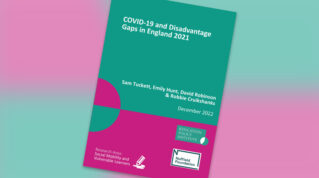Funding to cover teachers who are absent due to Covid-19 has been made available once again by the Department for Education, as workforce absences begin to climb in the sector.
The Covid-19 workforce fund, first brought in last December, has been opened again for FE colleges, sixth forms and specialist post-16 providers with separate guidance from schools accessing the fund.
There are few material differences between the two waves of funding, however this latest funding again excludes independent training and adult community learning providers.
This comes as the government’s latest data on attendance in education settings today shows 1.5 per cent of FE college teachers and leaders were absent due to Covid-19 on 24 November, up from 1 per cent on 10 November.
This week’s figures are an increase on the week of 20 October as well, where workforce absence rates were at 1.2 per cent.
Here are the key points from today’s guidance…
Cash will cover employing supply teachers or upping part-time teachers’ hours
“Colleges should only apply for this fund once they have used other options as far as possible,” the guidance reads.
But colleges can apply for this funding to cover the costs of employing supply teachers or support staff to cover teacher absences.
Or to increase the hours of part-time staff where they will be covering teacher absences.
The DfE has said: “Colleges should ensure staff are happy to temporarily increase their hours and consider their staff workload and wellbeing.”
Colleges cannot claim to cover absences by temporary staff, just permanent staff and those on long-term contracts, as well as educational and non-education support staff such as cleaners and caterers who are “necessary to avoid full or partial closure or fulfilling a legal duty”.
Funding only for colleges with 45 cash days or fewer
Sixth form and general FE colleges will be eligible for funding if their end of month cash position is 45 days or less at any point between November 2021 and March 2022, according to their November financial return.
Special post-16 providers will be eligible for the funding if their reserves at the end of March 2021 were no more than four per cent of their annual income.
The DfE has warned funding can be claimed back where these conditions are not met at the year-end.
Different absence rate thresholds for colleges and specialist providers
The absence threshold for this funding has been set for colleges at:
- a teacher absence rate at or above 20 per cent on a given day
- a teacher absence rate of 10 per cent or above for 15 or more consecutive days (not including weekends)
Colleges have to exceed either of these to be eligible and it ought to be calculated at a corporation level, not a teacher level.
The DfE expects providers to consider moving staff across different sites to make up for absences before considering spending on extra staff.
Where campuses are more than an hour apart by car, the absence threshold can be applied at a campus level.
Specialist providers must meet either of these thresholds:
- a total teacher and leader absence rate at or above 15 per cent on a given day
- a total teacher and leader absence rate of 10 per cent or above where that has been experienced for 15 or more consecutive days (not including weekends)
When claiming for education and non-education support staff costs, such providers must be experiencing:
- a total support staff absence rate (teaching assistants and other staff) at or above 15 per cent on a given day
- a lower total support staff absence rate (teaching assistants and other staff) of 10 per cent or above where that has been experienced for 15 or more consecutive days (not including weekends)
What assurance processes are involved
Colleges have to be able to prove they were open for on-site delivery on the days they are claiming for.
Records will have to be kept of all expenditure on staff absences and colleges cannot be claiming for costs from an existing insurance policy.
Colleges cannot claim until next spring

Much like the last time this fund was opened, providers cannot claim this funding until the following spring.
“Colleges will be able to make claims for costs eligible for reimbursement through this fund in spring 2022. We will publish detailed guidance about the claims process then,” the DfE has said.
The guidance highlights, though, colleges will continue to receive their core funding allocations, as well as their high needs funding from local authorities.
While colleges can use the 16-19 Tuition Fund, which received a £102 million expansion in February, to help students catch up with lost teaching, the DfE has stressed: “Colleges must not divert this funding to help meet the costs of staff absence.”
Colleges are expected to be financially prudent when sourcing cover, the guidance also instructs.

















Your thoughts